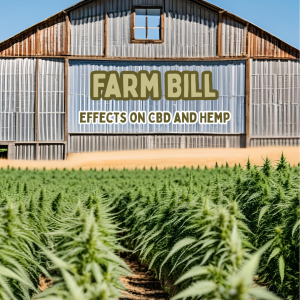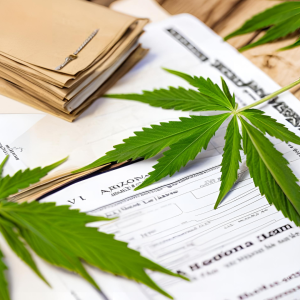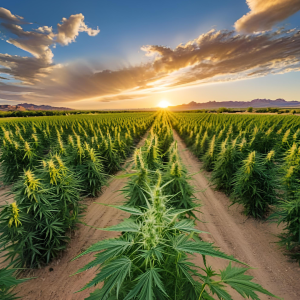Farm Bill 2025 and Hemp CBD: Major Impacts on Regulations and Industry Practices – Does this effect you?

How will the 2025 Farm Bill impact the Farm Bill 2025 and hemp CBD industry? The Farm Bill plays a crucial role in shaping U.S. agriculture, including the regulation and cultivation of hemp. This article explores the major regulatory changes, including new THC limits and what they mean for hemp products and businesses.
Key Takeaways
- The 2025 Farm Bill introduces tighter regulations on hemp-derived products, including stricter THC limits and new labeling requirements, aimed at enhancing consumer safety and market transparency.
- The bill redefines hemp to include Total THC concentration limits and mandates rigorous testing and verification processes, ensuring compliance and improving product safety within the industry.
- Economic projections for the North American hemp sector remain strong, with anticipated growth despite regulatory challenges; however, state-level interventions pose potential risks to the market’s stability.
The 2025 Farm Bill: Key Changes for the Hemp Industry
The 2025 Farm Bill marks a pivotal moment for the hemp industry, introducing several key changes aimed at refining and enhancing the regulatory framework established by the 2018 Farm Bill. The previous bill defined hemp as cannabis with a delta-9 THC concentration of less than 0.3 percent, a definition that significantly impacted its legal status. However, ongoing discussions and potential amendments in the 2025 Farm Bill aim to address the burgeoning concerns around THC regulation and the production of hemp-derived products. Proposed amendments are being considered by Congress and the Senate, with various drafts and legislative proposals seeking to clarify the legal definition of hemp, address regulatory gaps, and regulate cannabinoids like THCA and delta-8.
Prominent figures like Jonathan Miller and Mary Miller have been at the forefront of these discussions, emphasizing the need for a balanced approach that supports farmers while ensuring consumer safety. The new bill seeks to close existing loopholes and introduce tighter regulations on intoxicating hemp-derived products, which have been a point of contention within the industry. Lawmakers and industry advocates alike are rallying behind these changes, viewing them as necessary steps to secure the future of hemp cultivation and commerce. As legislative shifts occur, the deal-making process in Congress and the Senate, along with the introduction of formal proposals and amendments, will play a crucial role in shaping the final version of the bill.
As the hemp industry anticipates these legislative shifts, the focus remains on how these changes will be implemented and their broader implications. State and federal regulatory interplay remains a dynamic factor, pushing agricultural practices and interstate commerce, proceeding with caution under the law.
The 2025 Farm Bill promises to redefine the landscape, ensuring a more structured and compliant industry framework for the year.
Redefining Hemp: THC Limits and Legal Implications
One of the most significant aspects of the 2025 Farm Bill is the redefinition of hemp, particularly concerning THC limits and legal implications. The current definition, which hinges on a delta-9 THC concentration of less than 0.3 percent, has long been a cornerstone of hemp regulation. However, the proposed changes in the new bill aim to redefine hemp by targeting cannabinoids like delta-8 THC, which are currently legal under the existing framework but have raised concerns due to their intoxicating effects.
The new definition seeks to exclude certain cannabinoids not naturally found in the cannabis plant, effectively closing a loophole that has allowed the proliferation of hemp-derived products with intoxicating properties and extracts. For example, delta-8 THC has exploited this regulatory gap, leading to the widespread availability of products that some argue fall outside the intended scope of hemp legalization. This absence of naturally occurring cannabinoids is seen as a necessary step to prevent products marketed as intoxicating from being classified as hemp, thereby safeguarding consumer interests and ensuring product integrity.
However, the hemp industry has expressed concerns that these stringent definitions could potentially harm the market for hemp-derived cannabinoids, limiting the diversity of products available to consumers, including those regulated by the DEA. Some industry experts argue that the legal status of certain cannabinoids is a mistake resulting from ambiguous legislative language in previous bills.
The legal implications of these changes are profound, as they not only redefine what constitutes hemp but also set the stage for future regulatory actions. The 2025 Farm Bill seeks to clarify the distinction between hemp and marijuana by emphasizing naturally occurring, nonintoxicating cannabinoids, reducing legal ambiguities and promoting market transparency.
Impact on Hemp CBD Products

The 2025 Farm Bill’s impact on hemp-derived CBD products is significant, with new regulations set to transform industry practices. One of the most notable changes is:
- The prohibition of hemp cannabinoid products with measurable Total THC levels.
- The ban on products marketed as having effects similar to THC.
- Products exceeding the 0.3% THC threshold will face stringent restrictions.
Hemp-derived food and beverage products are also subject to these new regulations, affecting the way such consumables are produced and marketed.
These changes will fundamentally alter the landscape for many CBD manufacturers.
In addition to these prohibitions, the bill imposes new labeling requirements for CBD products:
- Items with THC levels surpassing 0.3% must now feature bold warning labels.
- These labels ensure that consumers are well-informed about the product’s contents and potential effects.
- The labeling mandates enhance transparency and protect consumers from unintentionally consuming intoxicating hemp-derived products.
Products containing THC above the legal threshold cannot be legally sold under the new rules, further restricting the availability of certain hemp-derived items.
Furthermore, the 2025 Farm Bill mandates enhanced security measures for hemp businesses. Strict testing protocols for product safety and quality are now mandated, along with robust security measures for storage and transportation. These protocols are designed to ensure that products reaching the market are safe, consistent, and of high quality, thereby bolstering consumer confidence and industry credibility.
New Regulatory Measures and Compliance
The 2025 Farm Bill introduces a suite of new regulatory measures aimed at ensuring compliance and safety within the hemp industry. A key change is the redefinition of hemp to include a Total THC concentration limit, covering both THC and its acid form, THCA.
This new definition restricts hemp products to those containing naturally occurring, nonintoxicating cannabinoids, thereby tightening the regulatory framework and ensuring greater consistency and safety in the market.
Providing clear compliance data and accessible resources is essential for users, such as licensed producers and industry stakeholders, to navigate regulatory requirements and make informed decisions.
Verification Successful Waiting Periods
The 2025 Farm Bill mandates verification processes, including mandatory waiting periods before hemp-derived products can be marketed, to ensure compliance. These waiting periods are designed to provide sufficient time for thorough verification and testing, ensuring that products meet the stringent safety and quality standards set forth by the new regulations.
These verification processes are crucial for maintaining the integrity of the hemp market. The new regulations mandate rigorous testing and verification to protect public health and ensure only compliant, nonintoxicating hemp-derived products are available to consumers.
Security and Control Measures
The 2025 Farm Bill also mandates enhanced security measures across all levels of hemp production to mitigate risks and ensure consumer safety. These measures include strict quality control protocols, such as testing for contaminants and ensuring product consistency, which are essential for maintaining high standards in the industry.
Adherence to these new security and control measures involves regular audits and strict compliance with state and federal guidelines, now more rigorously defined. This comprehensive approach to security and control aims to create a safer, more reliable hemp market, thereby fostering consumer trust and supporting the industry’s growth.

Economic Impact on the Hemp Market
The economic impact of the 2025 Farm Bill on the hemp market is expected to be significant, with both challenges and opportunities on the horizon. Key points include:
- The North American hemp sector is projected to experience a compound annual growth rate of 22.4%.
- The market could potentially reach a valuation of $30.24 billion by 2029.
- Despite regulatory challenges, the USDA noted an 18% increase in the value of industrial hemp production from 2022 to 2023.
This growth presents substantial potential for job creation across the industry, but regulatory changes could also put many jobs at risk if restrictions or bans are implemented.
However, the failure of federal legislation regarding hemp-derived THC has led to increased state-level interventions that threaten the hemp market. States like California and Texas are moving towards more prohibitive measures, including outright bans on certain hemp-derived THC products. These state-level actions, combined with ongoing banking restrictions, continue to hinder cannabis businesses, forcing many to operate primarily in cash. Regulatory differences across the country create a patchwork of laws that impact the hemp and cannabis industries, making it challenging for businesses to operate consistently nationwide.
Moreover, the lack of federal schedule rescheduling creates uncertainty for the future of hemp-derived products and their legal status. The one year extension of the 2018 Farm Bill, which was passed in November, has extended regulatory uncertainty for years, leaving industry stakeholders waiting for more permanent legislative solutions.
As large marijuana operators expand into the hemp market and competition from established sectors like alcohol and tobacco intensifies, the economic landscape for hemp producers remains dynamic and challenging. Co operating in the hemp sector must adapt to these ongoing changes, especially as key legislative decisions are expected in March.
Responses from Industry Stakeholders
The 2025 Farm Bill has elicited varied responses from industry stakeholders, reflecting the diverse interests and concerns within the hemp industry. The U.S. Hemp Roundtable, for instance, criticized Tennessee’s new legislation, describing it as detrimental to the hemp industry and favoring the alcohol sector. Lawmakers like Sen. Richard Briggs have justified the new regulations by stating that the intent is to treat hemp-derived cannabinoid products similarly to alcohol for public safety reasons.
Concerns have also been raised by Tennessee lawmakers about the abrupt changes to regulations after previous assurances had been provided to farmers and business. Lt. Gov. Dan Patrick has played a significant role in shaping hemp and THC regulation in Texas, influencing broader cannabis policy discussions. The Tennessee Growers Coalition voiced strong opposition to restrictive measures, claiming they primarily serve the interests of the liquor industry. These reactions highlight the ongoing tension between regulatory efforts and industry interests, including those from the gov.
Additionally, consolidation trends in the industry have seen larger companies acquiring smaller operators, impacting market competitiveness. These dynamics underscore the complexity of the hemp market and the varied responses from stakeholders navigating the changing regulatory landscape. It is increasingly important for industry partners to collaborate in order to effectively address and adapt to evolving regulatory changes.
Future Outlook for Hemp and CBD
The future outlook for the hemp and CBD industry is marked by both optimism and caution. Key points include:
- The cannabis industry is anticipated to reach sales of over $50 billion by 2025, despite facing multiple challenges.
- Industry experts argue that excluding THCA from the federal definition of hemp presents significant market opportunities for hemp producers.
- This exclusion could pave the way for a clearer regulatory environment and new product innovations.
Changing consumption patterns, including rising preferences for edibles and vapes, are expected to influence the industry’s trajectory. As consumer preferences evolve, the hemp and CBD market must adapt to meet these demands, offering a diverse range of products that comply with the new regulatory standards.
Despite the hurdles, the hemp industry remains resilient, driven by innovation and a growing consumer base. The 2025 Farm Bill, with its stringent regulations and redefined definitions, sets the stage for a more robust and compliant market, ensuring the industry’s sustainable growth and long-term viability. Ongoing policy debates in Washington will continue to influence the future of hemp and CBD regulation.
Summary
The 2025 Farm Bill represents a significant milestone for the hemp industry, introducing crucial changes that redefine THC limits, impose new regulatory measures, and enhance compliance protocols. These changes are aimed at ensuring consumer safety, product integrity, and market transparency. While the new regulations present challenges, they also offer opportunities for innovation and growth within the industry.
As the hemp market navigates this transformative period, stakeholders must adapt to the evolving regulatory landscape, leveraging the new guidelines to build a more resilient and compliant industry. The future of hemp and CBD is promising, with the 2025 Farm Bill laying the groundwork for a safer, more transparent, and prosperous market.
Frequently Asked Questions
What are the key changes introduced by the 2025 Farm Bill?
The 2025 Farm Bill introduces significant changes by redefining hemp with a Total THC concentration limit, establishing new labeling requirements, enhancing security measures, and enforcing mandatory product verification waiting periods. These updates aim to improve regulation and ensure product integrity in the hemp industry.
How does the new definition of hemp impact the industry?
The new definition of hemp impacts the industry by restricting hemp products to only those that contain nonintoxicating cannabinoids, thereby closing loopholes that previously permitted the sale of intoxicating hemp-derived products. This shift creates a clearer regulatory framework, enhancing consumer safety.
What are the new labeling requirements for hemp CBD products?
Hemp CBD products with THC levels exceeding 0.3% are required to have bold warning labels that inform consumers about the product’s contents and potential effects. This measure ensures transparency and safety for consumers.
How will the new regulations affect the economic landscape of the hemp market?
The new regulations will likely enhance growth opportunities in the hemp market; however, challenges such as regulatory complexities, state interventions, and competition from other industries will persist.
What is the future outlook for hemp and CBD products?
The future outlook for hemp and CBD products is promising, characterized by projected industry growth and evolving consumer preferences that will foster innovation and market diversification, despite existing regulatory challenges.
